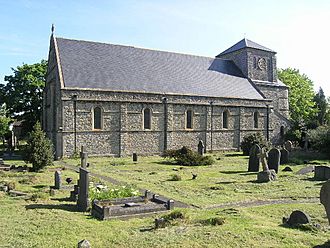St Peter's Church, Bishopsworth facts for kids
Quick facts for kids St Peter's Church |
|
|---|---|
 |
|
| General information | |
| Architectural style | Neo-Norman |
| Town or city | Bristol |
| Country | England |
| Coordinates | 51°24′53″N 2°37′11″W / 51.4148°N 2.6197°W |
| Construction started | 1194 |
| Completed | 1843 |
| Design and construction | |
| Architect | Samuel Charles Fripp |
St Peter's Church (grid reference ST570686) is a beautiful church in Bishopsworth, Bristol, England. It was built in a style called Neo-Norman. This means it looks like the old Norman buildings from hundreds of years ago, but it was actually built much later.
Contents
History of St Peter's Church
The First Chapel (1194)
The very first church building in Bishopsworth was a small chapel. It was named after St Peter and St Paul. This chapel was built in 1194. It was part of an agreement between Robert Arthur, who was the local lord of the manor, and George de Dunster, a church official from Bedminster.
The agreement said that a priest would visit the chapel from Bedminster. This happened every Wednesday, Friday, and Sunday. This arrangement continued for many years. It stopped in 1540 when many chapels and monasteries were closed down by the king. After that, the old chapel building was changed into three small houses. These houses stood until 1961. They were then taken down to make space for a swimming pool.
Building the Current Church (1841-1843)
The church you see today, also called St Peter's, was built much later. Its construction started in 1841 and finished around 1843. The church was designed by an architect named Samuel Charles Fripp. He chose the Neo-Norman style, which gives the church its unique old-fashioned look.
The original plan for the church included a tall tower. However, this tower was never fully completed. In 1853, St Peter's became a parish church. This means it became the main church for the local area. The church has not changed much since it was built. The only major addition was a vestry and porch area. This was added in 1877.
Special Recognition and War Graves
St Peter's Church is a very important building. English Heritage has given it a special status as a Grade II* listed building. This means it is a historically important building that needs to be protected.
The churchyard also holds a special place. It contains war graves for four soldiers. These brave individuals served in the Air Force and Royal Navy during World War II.
See also
- Churches in Bristol
- Grade II* listed buildings in Bristol
 | Jessica Watkins |
 | Robert Henry Lawrence Jr. |
 | Mae Jemison |
 | Sian Proctor |
 | Guion Bluford |

